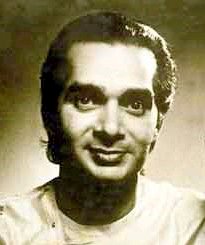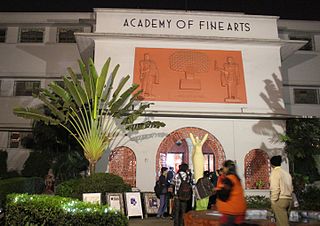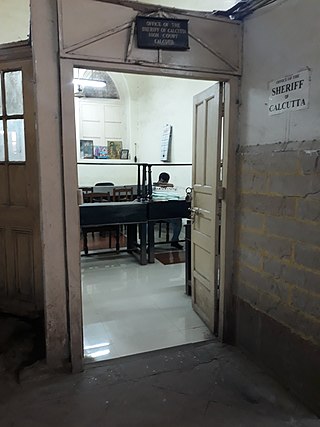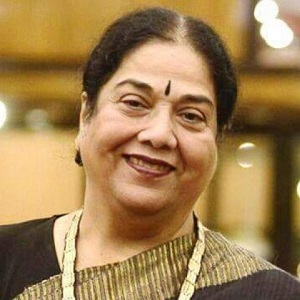
Uday Shankar was an Indian dancer and choreographer, best known for creating a fusion style of dance, adapting European theatrical techniques to Indian classical dance, imbued with elements of Indian classical, folk, and tribal dance, which he later popularised in India, Europe, and the United States in 1920s and 1930s. He was a pioneer of modern dance in India.

Utpal Dutta was an Indian actor, director, and writer-playwright. He was primarily an actor in Bengali theatre, where he became a pioneering figure in Modern Indian theatre, when he founded the "Little Theatre Group" in 1949. This group enacted many English, Shakespearean and Brecht plays, in a period now known as the "Epic theatre" period, before it immersed itself completely in highly political and radical theatre. His plays became an apt vehicle for the expression of his Marxist ideologies, visible in socio-political plays such as Kallol (1965), Manusher Adhikar, Louha Manob (1964), Tiner Toloar and Maha-Bidroha. He also acted in over 100 Bengali and Hindi films in a career spanning 40 years, and remains most known for his roles in films such as Mrinal Sen’s Bhuvan Shome (1969), Satyajit Ray’s Agantuk (1991), Gautam Ghose’s Padma Nadir Majhi (1993) and Hrishikesh Mukherjee's breezy Hindi comedies such as Gol Maal (1979) and Rang Birangi (1983). He also did the role of a sculptor, Sir Digindra Narayan, in the episode Seemant Heera of Byomkesh Bakshi on Doordarshan in 1993, shortly before his death.

New Theatres is an Indian film studio. It was formed in Calcutta by producer B. N. Sircar. It was formed on 10 February 1931. Motto of this company was– Jivatang Jyotiretu Chhayam. Sircar preferred to function
Bhowanipore is a neighbourhood of South Kolkata in Kolkata district of West Bengal, India.

Indian People's Theatre Association (IPTA) is the oldest association of theatre-artists in India. IPTA was formed in 1943 during the British rule in India, and promoted themes related to the Indian freedom struggle. Its goal was to bring cultural awakening among the people of India.

The Academy of Fine Arts, in Kolkata is one of the oldest fine arts societies in India.

The Sheriff of Kolkata is an apolitical titular position of authority bestowed for one year on a prominent citizen of Kolkata (Calcutta). The Sheriff has an office and staff in Calcutta High Court but does not have executive powers. Mumbai (Bombay) and Kolkata are the only cities in India to maintain the post of Sheriff. Presently the office of the Sheriff is situated in the Calcutta High Court building.

Suchitra Mitra was an Indian singer, composer, artist exponent of Rabindra Sangeet or the songs of Bengal's poet laureate Rabindranath Tagore, professor, and the first woman Sheriff of Kolkata. As an academic, she remained a professor and the Head of Rabindra Sangeet Department at the Rabindra Bharati University for many years. Mitra was a playback singer in Bengali films and was associated for many years with the Indian People's Theatre Association.
Sombhu Mitra was an Indian film and stage actor, director, playwright, reciter and an Indian theatre personality, known especially for his involvement in Bengali theatre, where he is considered a pioneer. He remained associated with the Indian People's Theatre Association (IPTA) for a few years before founding the Bohurupee theatre group in Kolkata in 1948. He is most noted for films like Dharti Ke Lal (1946), Jagte Raho (1956), and his production of Rakta Karabi based on Rabindranath Tagore's play in 1954 and Chand Baniker Pala, his most noted play as a playwright.

Cinema of West Bengal, also known as Bengali cinema or Tollywood, is an Indian film industry of Bengali-language motion pictures. It is based in the Tollygunge region of Kolkata, West Bengal, India. The origins of the nickname Tollywood, a portmanteau of the words Tollygunge and Hollywood, dates back to 1932. It was a historically important film industry, at one time the centre of Indian film production. The Bengali film industry is known for producing many of Indian cinema's most critically acclaimed global Parallel Cinema and art films, with several of its filmmakers gaining prominence at the Indian National Film Awards as well as international acclaim.

Shyamanand Jalan was a Kolkata-based Indian theatre director, and actor. He is credited for the renaissance period of modern Indian theatre and especially the Hindi theatre in Kolkata from the 1960s to 1980s. He was the first to perform modernist Mohan Rakesh, starting with Ashadh Ka Ek Din in 1960 and in the coming years bridged the gap between Hindi theatre and Bengali theatre, by mounting Hindi productions of works by Bengali playwrights, like Badal Sircar's Evam Indrajit (1968) and Pagla Ghora (1971), which in turn introduced Sircar to rest of the country. In 2005, he directed his first and only film Eashwar Mime Co., which was an adaptation of Dibyendu Palit's story, Mukhabhinoy, by Vijay Tendulkar.

Birendranath Sircar was an Indian film producer and the founder of New Theatres Calcutta. He made Bengali-language films that were noted for introducing many film directors who later became famous. He was awarded the Dada Saheb Phalke Award in 1970 and the third highest civilian award in India, the Padma Bhushan, in 1972.

Usha Ganguli was an Indian theatre director-actor and activist, most known for her work in Hindi theatre in Kolkata in the 1970s and 1980s. She founded Rangakarmee theatre group in 1976, known for its productions like Mahabhoj, Rudali, Court Martial, and Antaryatra. Apart from thespian Shyamanand Jalan of Padatik, she was the only other theatre director to practise Hindi theatre in Kolkata, which is largely Bengali speaking.

Priya Cinema is a uniplex cinema hall situated in Rashbehari Avenue, near Deshapriya Park, Kolkata, West Bengal, India. The management is run by Priya Entertainments Pvt. Ltd. under the leadership of the managing director Arijit Dutta. This is one of the first cinema halls in eastern India to have features like a Dolby Atmos [(sound system)], Xenon Christie projector, Recliner seats, QUBE digital projection system, Harkness Screen and 2K Projection System.

Metro Cinema or Metro Cinemas is a uniplex cinema hall and a heritage building located in Jawahar Lal Nehru Road (Esplanade), Kolkata, West Bengal, India. This theatre was opened by Metro-Goldwyn-Mayer in 1935. It is currently owned by a Mumbai-based firm and is undergoing a renovation to be converted into a multiplex theatre. The building is located in the posh Esplanade area of Kolkata, right at the heart of the city. It is a heritage structure and a very famous landmark of the city of Kolkata. And one of the many famous cinema halls in the Esplanade area of Central Kolkata.

Globe Cinema was a single screen cinema hall and heritage building located in Lindsay Street, Kolkata, West Bengal, India. The theatre was previously known as Old Opera House. The wooden opera house was established in 1827 and sold to E M Cohen in 1906. Cohen converted it into a movie theatre and named it Globe Cinema. The theatre was owned by Sidhwa family and Jal Tata. Dhansri Abasan Pvt Ltd partnered with Goldstar Enclave Pvt Ltd and acquired the Globe Theatre Pvt Ltd from them.
Lighthouse Cinema was a single screen cinema hall and heritage building located in Humayun Place in New Market, next to New Empire, Kolkata, West Bengal, India.

Natir Puja is the only film where Rabindranath Tagore is credited as director. This film is a recording of Tagore's 1926 stage dance-drama of the same name.
Once Upon A Time In Calcutta is a 2021 Bengali language Indian-French-Norwegian film directed by Aditya Vikram Sengupta. It is the third film by the Indian director and produced by Wishberry Films, in association with For Films, with Catherine Dussart Productions and DUOfilm As. The film had its world premiere at the 78th Venice International Film Festival in September 2021.















